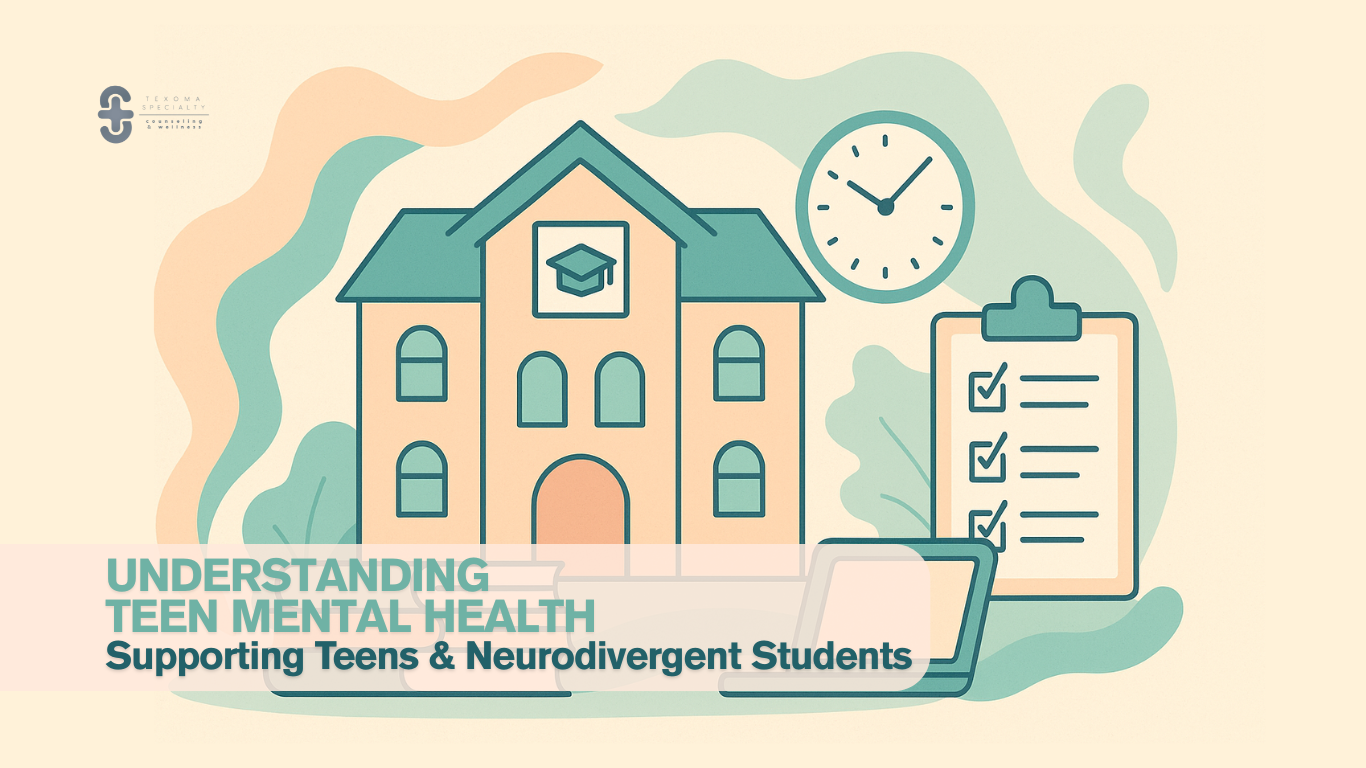Understanding Teen Mental Health
Navigating Back-to-School Anxiety
Back-to-school transitions can stir up a mix of excitement and worry—for parents and teens alike. Anxiety is common during this shift, and for neurodivergent students (including those with ADHD, autism, learning differences, and anxiety disorders), the return to routines and new environments can be especially challenging. With the right supports, families can turn this season into a launchpad for confidence, connection, and mental wellness.
Tips for Parents and Teens: Dealing with School Anxiety
Back-to-school anxiety often shows up as:
Sleep disruptions 🛏️
Irritability 😠
Stomachaches 🤢
Worries about friends or teachers 👫
Avoidance behaviors, like asking to stay home 🚫
Practical steps can ease the transition:
Visit open houses or walk-throughs before day one.
Establish predictable routines (bedtime, mornings, meals).
Talk about the positives, and model calm while validating feelings.
Use “cope-ahead” plans—practice how to handle common stressors and do test runs.
💡 Parents should also monitor their own stress, since kids quickly pick up on caregiver anxiety【source: Child Mind Institute】.
Neurodiversity and Inclusive Mental Health at School 🌈
A neurodiversity-affirming approach recognizes that brains learn differently, and success comes from matching supports to needs. For ADHD and other neurodivergences, the restart of school can magnify executive function demands (time management, organization, task initiation) and sensory/social stress.
Inclusive strategies include:
Predictable routines and visual schedules 📅
Movement breaks and flexible seating 🪑
Advance priming with schedules and class maps 🗺️
Framing strengths and setting achievable goals 🌟
Building a home–school plan with teachers and counselors 🤝
Red Flags: When Anxiety Needs More Support 🚩
Watch for patterns that persist beyond the first few weeks or cause significant impairment:
Frequent school refusal
Ongoing sleep problems
Panic symptoms
Sustained irritability or withdrawal
Declining grades
Headaches or stomachaches tied to school days
If these continue, consult a pediatrician or licensed mental health professional, and involve the school’s counseling team【source: AACAP】.
The Digital Layer: Phones, Social Media & Mental Health
Digital environments can amplify back-to-school stress through comparison, FOMO, and disrupted sleep. Practical steps:
Rebuild sleep schedules two weeks before school.
Charge devices outside bedrooms.
Create a simple phone plan (off during class, check at lunch).
Curate feeds and unfollow stress-amplifiers.
Use Do Not Disturb during homework blocks.
Parent Playbook: Evidence-Informed Tips 📖
Visit orientation and walk the building.
Start routines early: mornings, meals, homework, screens.
Validate feelings—avoid dismissing or over-reassuring.
Practice gradual exposures for feared situations.
Create a “first-week plan”: sleep schedule, backpack checklist, calming ritual.
Partner with school mental health teams.
For Neurodivergent Students: Tailored Supports That Work 🧩
Visual planners, color-coded folders, and checklists for executive skills.
Quiet corners, movement breaks, and sensory tools for regulation.
Weekly home–school check-ins for consistency.
Strength-first engagement through clubs, projects, or interests.
Our Team Can Help 💙
At Texoma Specialty Counseling, our counselors specialize in youth and adolescent anxiety and understand the unique needs of neurodivergent learners. We collaborate with families, schools, and pediatric providers to create practical, compassionate plans—so teens can return to school feeling prepared, supported, and seen.
Quick Start Checklist for Families ✅
Two-week routine ramp (sleep, meals, screen limits).
School preview: open house, teacher email, peer meet-up.
Night-before ritual: backpack packed, clothes out, alarms set.
Coping menu: three quick strategies your teen chooses.
Daily debrief: 10-minute check-in on wins and challenges.
👉 If back-to-school anxiety is affecting your family, you don’t have to navigate it alone. Contact Texoma Specialty Counseling today.


